#shopify retail pos
Text
Shopify Commerce & Retail POS Tutorial for Ecommerce Developer & Merchandiser
Full Video Link - https://youtube.com/shorts/9gFn1FcXaL4
Hi, a new #video on #shopify #ecommerce and #retail #pos #platform is published on #codeonedigest #youtube channel.
@java #java #awscloud @awscloud #aws @AWSCloudIndia #Cloud #CloudComputing @Yo
Shopify is a commerce platform that allows anyone to set up an online store and sell their products. Merchants can also sell their products in person using Shopify POS i.e., Point of sale.
Shopify was founded in 2006 by Tobias Lütke and Scott Lake after attempting to open Snowdevil, an online store for snowboarding equipment. They quickly realize that there is no adequate online selling…
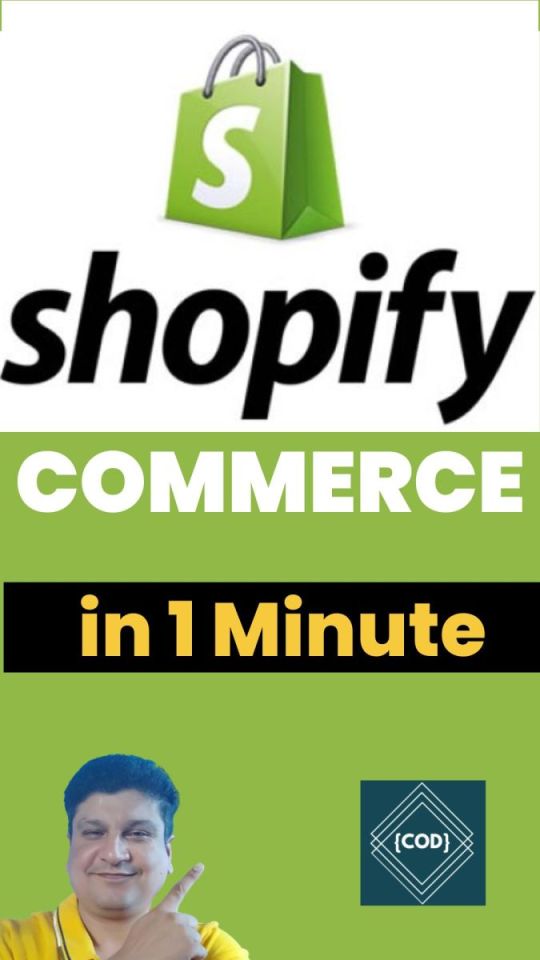
View On WordPress
#complete shopify tutorial#shopify#shopify commerce#shopify commerce components#shopify commerce manager#shopify ecommerce#shopify ecommerce store#shopify ecommerce tutorial#shopify ecommerce website#shopify ecommerce website design#shopify ecommerce website tutorial#shopify pos#shopify pos tutorial for beginners#shopify retail pos#shopify retail store#shopify tutorial#shopify tutorial for beginners#shopify tutorial for beginners 2023
0 notes
Text

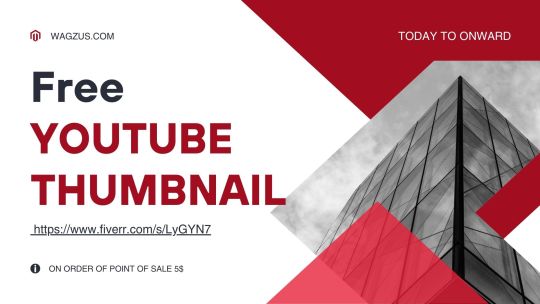
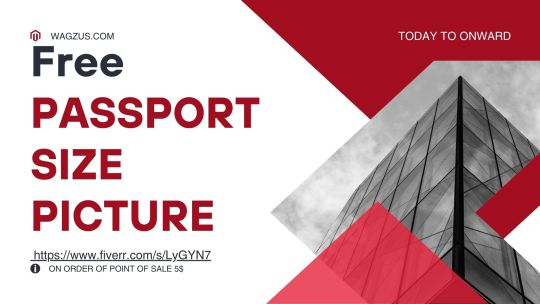



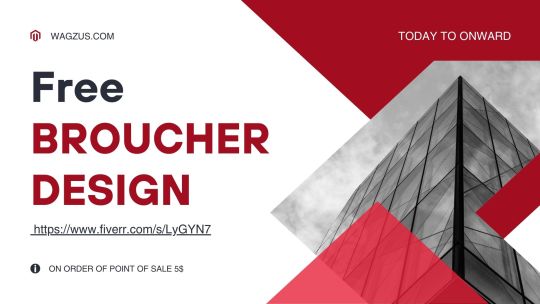


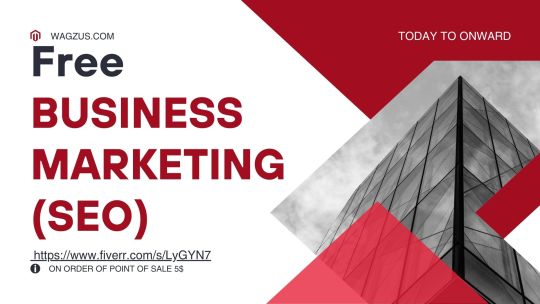

we are website development company wagzus.com, we are offering free website,logo,letter head, business card, broucher, marketing seo on just ordering of our product https://www.fiverr.com/s/QvoXoe in 5$.
#point of sale system#website design#website development#website developers#pos system#pos software#pos solutions#restaurant pos system#retail pos system#logo design#graphic design#leaflet#wordpress#wordpress themes#custom wordpress development#shopify#ecommerce#woocommerce#youtube thumbnail
5 notes
·
View notes
Text
#Store POS#specialty store pos#shopify store#health foods store point of sale#pos for stores#small store pos#booze store pos#charity stores#liquor store pos#retail store app#thrift store pos#pos for meat store#pos for fish store#spirits store pos#alcohol store pos#thrift store cash#convenience store#multi store pos app#thrift store system#pos for thrift store#package stores pos#liquor store pos system#pos for grocery stores#best pos for liquor store
1 note
·
View note
Text
Counterpoint POS + Shopify Integration

Introducing Counterpoint Shopify Integration, Octopus Bridge - the revolutionary solution that will revolutionize the way you manage your offline and online retail stores. With this ready-to-use solution, you can now easily and quickly unify both your offline and online stores, saving time and effort while increasing customer satisfaction. This ingenious integration makes it easy and straightforward to connect Counterpoint Point of Sale systems with Shopify web stores. You'll be able to synchronize inventory, customers, and orders.
Visit to know more: https://www.24sevencommerce.com/ncr-counterpoint-shopify-integration.html
#Counterpoint Shopify Integration#shopify integration#pos ecommerce integration#ecommerce solutions#sync inventory#omnichannel#inventory management#ecommerce integration#ecommerce#retailers
0 notes
Text
What are some alternatives to Vend for small businesses?

There are several alternatives to Vend that small businesses can consider, including:
Square Point of Sale: This is a free point-of-sale app that can be used on a mobile device or tablet. It offers inventory management, sales reporting, and customer management features.
Shopify: A popular e-commerce platform that also offers a point-of-sale system for brick-and-mortar stores. It includes features such as inventory management, reporting, and customer management.
Lightspeed Retail: A cloud-based point-of-sale and retail management system that includes inventory management, reporting, and customer management.
QuickBooks POS: A point-of-sale system that integrates with the QuickBooks accounting software. It offers inventory management, sales reporting, and customer management features.
Clover POS: A point-of-sale system that can be used on a mobile device or tablet. It offers inventory management, reporting, and customer management features.
These are just a few examples and it's important to evaluate each one based on your specific business needs.
3 notes
·
View notes
Text
Top Point of Sale Companies for Streamlined Business Solutions

When choosing a point of sale (POS) company for your business, you’re not just selecting a payment processor—you’re investing in a system that can streamline operations, manage inventory, track sales, and improve customer satisfaction. The right point of sale company can help small to medium-sized businesses scale efficiently. This guide explores some of the top point of sale companies and the key features to consider when selecting one.
Why Point of Sale Companies Matter
Point of sale companies provide essential tools that allow businesses to manage both front-end and back-end operations with ease. From processing transactions to offering detailed analytics and customer relationship management, a reliable POS system is critical to your business's success. With the rise of contactless payments and e-commerce integration, POS companies have become more important than ever.
Key benefits of using a POS system include:
Efficient Transaction Processing: Quick and accurate payment processing improves customer experience.
Inventory Management: Real-time tracking of stock levels helps prevent overstocking or running out of items.
Sales Reporting: Detailed reports provide insights into your best-selling products and busiest times.
Employee Management: Track employee performance and manage schedules more effectively.
Top Point of Sale Companies in 2024
Square: Square is one of the most popular point of sale companies, known for its ease of use and versatility. It offers a free POS system with features such as inventory management, sales reporting, and e-commerce integration. Square's hardware options are affordable, making it an excellent choice for small businesses.
Shopify: Shopify is ideal for businesses that operate both in-store and online. Its POS system integrates seamlessly with its e-commerce platform, allowing you to manage inventory across multiple sales channels. Shopify’s POS also includes features like customer profiles, loyalty programs, and mobile payments.
Clover: Clover offers highly customizable POS solutions for businesses of all sizes. It provides a range of hardware options, from mobile POS systems to more comprehensive setups. Clover's features include CRM tools, employee management, and detailed sales reports, making it suitable for both retail and service-based businesses.
Lightspeed: Lightspeed is perfect for businesses with more complex inventory needs, such as restaurants, retail stores, and hospitality venues. It provides multi-location management, detailed reporting, and advanced inventory tracking. Lightspeed is scalable, which makes it a strong choice for growing businesses.
Toast: Tailored specifically for restaurants, Toast is a cloud-based POS system designed to handle the fast-paced environment of food service. It offers features such as menu management, online ordering, and detailed analytics, helping restaurant owners streamline their operations and increase profitability.
How to Choose the Right Point of Sale Company
When selecting a point of sale company, it’s important to consider factors that align with your business needs. Here are some key aspects to evaluate:
User-Friendly Interface: The system should be easy to use for both you and your staff. A complicated system can slow down operations and lead to frustration.
Customization Options: Ensure the POS system can be customized to fit your business model, whether you're a retail store, restaurant, or service provider.
Cost: Evaluate both the upfront costs of hardware and ongoing subscription fees. Many companies offer tiered pricing plans that grow with your business.
Integration with Other Tools: Make sure the POS system integrates with other software you already use, such as accounting tools, e-commerce platforms, or loyalty programs.
Customer Support: Look for a company with strong customer support that can assist with setup, troubleshooting, and ongoing maintenance.
Conclusion
Point of sale companies play an essential role in modern business operations. From basic payment processing to comprehensive management tools, the right POS system can help improve efficiency, increase sales, and provide valuable insights into your business. Whether you’re looking for a simple solution like Square or a more robust system like Lightspeed, it’s important to choose a point of sale company that meets your business needs and supports your long-term growth.
0 notes
Text
12 Reasons Why Brands Migrate to Shopify Plus (2024)
Shopify Plus is one of the fine structures obtainable in case you need to do e-trade. More than 61000 stores use it international, and it is turning into famous amongst mounted manufacturers virtually fast. But why are store owners migrating to Shopify Plus regardless of the excessive price? Transform your vision into reality with Shopify website developers who deliver cutting-edge, tailored e-commerce solutions for your business.

We’ll explore key reasons emigrate to Shopify Plus and how it could gain your on line commercial enterprise.
What is Shopify Plus?
For people who don’t precisely have an idea about Shopify Plus, It’s the best tier of the Shopify plan you could in all likelihood get. It’s designed for excessive-quantity merchants and companies desiring advanced features and help.
Popular logo names you may recognize and keep at, including Kylie Cosmetics, Netflix, Tesla, and Heinz, are on Shopify Plus.
Why Migrate to Shopify Plus?
Listed below are 12 great reasons why Shopify Plus is a superb desire for your enterprise increase:
1. Intuitive User Interface
Shopify Plus focuses on simplicity and consistency, ensuring that users can fast apprehend and use the interface without extensive schooling. The Organization phase lets you get right of entry to and control components of your employer, which includes users and stores, in a single region.
As your business grows, your statistics desires get more complex, and your dashboard is evolving with you. For Shopify Plus users, the dashboard now consists of more features like mixture corporation-level analytics and superior consumer permissions for large groups.
Shopify Plus dashboard
(Aggregate agency-level statistics perception for Shopify Plus customers, Source: Shopify)
Using the organisation evaluation dashboard, you could see all shop performance across your enterprise at a glance. This gives you a higher concept of the way things are going across your enterprise and allows you make clever, impactful choices quicker.
2. Sell anywhere. Manage the whole lot in a single region
Shopify Plus helps promoting across a couple of channels, which include on-line stores, physical stores (POS), 100+ social media platforms (i.E., Facebook, Instagram, Snapchat), and 80+ marketplaces together with Amazon and eBay.
Social media platforms integrations
The local omnichannel retailing integrates patron interactions across all touchpoints, making sure a unified enjoy no matter the channel used. You can manage inventory, orders, and customer records from a unmarried vital region.
Shopify Plus
This method can drastically decorate customer pride and lengthy-term business fulfillment. According to Aberdeen Group Inc., companies with robust omnichannel engagement retain 89% of their customers, compared to 33% for the ones without (through digitalcommerce360).
3. Automate Workflows for Faster Operations
Automating repetitive responsibilities permits groups to do extra in less time. With a few clicks, you could automate advertising campaigns and strategies using Shopify Script, Flow, and Launchpad.
Custom workflows can automate every day operations, along with sending abandoned cart emails, producing labels, and updating inventory. Using Launchpad, you could also time table income occasions like Black Friday in advance to exchange topics, observe reductions, and alter product visibility automatically.
Automate and schedule sales campaigns using Launchpad
(Automate and schedule sales campaigns the use of Launchpad, supply: Shopify)
These automation help improve performance and free up valuable human assets, main to value savings on your commercial enterprise.
4. Craft a Unique Brand Experience With Advanced Theme Control
Shopify Plus helps you to construct a store that represents your emblem’s particular identity. You can Upload and control up to one hundred issues. Additionally, It offers full get admission to to theme code Liquid, which means traders can alter HTML, CSS, and JavaScript code to obtain the desired look and functionality for their on-line shops. Stand out in the digital marketplace with shopify web developer who specialize in creating sleek, high-performance online stores.
Shopify subject code Liquid
5. Personalized Checkout Experiences
Shopify Plus gives you good sized customization options for checkout pages via the checkout.Liquid file. You get complete manage over the format, branding, and order waft. Additionally, users can leverage superior API integrations like Shopify GiftCard, Shopify Multipass, and Shopify User to similarly beautify the checkout.
Personalized Checkout Experiences for Shopify Plus customers
Shopify delivered Checkout Extensibility completely for Shopify Plus users. It we could merchants add upsell offers, streamline pixel tracking, and different advanced capabilities to their checkout, so it’s quicker and converts higher. With this unique function, Shopify Plus merchants can do infinite adjustments to their checkout with out checkout.Liquid document even as last upgrade-secure.
6. Advanced Customization Options with Custom Scripts and APIs
Shopify Plus offers improved customization talents thru the use of custom scripts and APIs. The Script Editor lets in traders to create precise functionalities without relying totally on pre-constructed apps.
You can write custom code to put in force unique promotions, manage transport options, and customize fee techniques at checkout. Additionally, Shopify Plus’ script editor includes a simulation device so you can take a look at scripts thoroughly without affecting actual clients.
Shopify Functions
Shopify Functions affords an opportunity to Shopify Scripts. They help traders make bigger Shopify’s backend common sense with custom code to customize unique elements of the consumer enjoy. Developers write these mini-packages, however you don’t want to be a coder to use them.
Shopify Functions
Functions perform solely at the server facet and are designed to execute quick, with a performance limit of 5ms, making them 100x quicker than Scripts. This guarantees that customizations do not degrade overall performance, supplying a easy and efficient shopping enjoy for customers.
Here are a few examples of what you may do with Shopify Functions:
Create new discount sorts for users.
Hide precise price options at checkout.
Show a unique message to customers on their birthday.
Automatically translate your product descriptions into different languages.
Headless Commerce Capabilities
Headless Commerce Capabilities
In Shopify Plus, you may go headless, which gives you ultimate control over the the front-give up presentation layer. You can decouple the front stop (consumer interface) from the returned quit (e-trade engine). This permits agencies to apply any frontend framework of their preference to create a bespoke customer revel in.
7. High Performance and Scalability
Shopify Plus offers advanced performance and scalability. It is designed to deal with high-volume transactions and traffic spikes effortlessly.
Unlimited bandwidth and income.
No limit at the wide variety of SKUs, however versions in step with product are confined to 100, extendable with customizable options and third-party apps.
Handles excessive visitors, processing over 80,000 requests according to 2d.
Fast checkout method, capable of over 10,000 checkouts in keeping with minute.
Manages over 8,000 orders in keeping with minute, ideal for excessive-extent businesses.
Allows limitless group of workers customers for clean team control.
The platform’s infrastructure uses a cluster of Shopify’s own servers, in conjunction with a few AWS feature-primarily based augmentations. With this setup, you get ninety nine.Ninety nine% uptime and may handle lots of transactions per minute without slowing down.
The platform’s self-scaling architecture can without problems control Black Friday-degree traffic yr-round, making sure that groups can scale up their operations seamlessly.
8. High-Security Standards
High-Security Standards in Shopify Plus
With Shopify Plus, you get enterprise-main safety practices that defend your shop and your customers’ statistics. Here are the important thing security standards provided through Shopify Plus:
Fully PCI DSS Level 1 compliant for secure credit score card transactions.
SSL, TLS, and AES-256 encryption protocols prevent unauthorized get entry to to data in transit and at relaxation.
MFA requires multiple forms of identity for admin panel get entry to.
SAML authentication allows integration with identity vendors, enhancing safety.
SCIM simplifies person provisioning and control across structures.
Advanced fraud equipment pick out and block fraudulent transactions.
Bot protection.
Regular updates and active tracking.
Customizable roles and permissions.
Automated backups.
Helps businesses observe GDPR for records protection.
Nine. Global Selling with Expansion Stores
Global Selling with Expansion Stores
With Shopify Plus, the sector is your market. You can build a global brand presence in as much as 50 markets, set up and control up to 10 growth shops, and have every shop have a dedicated storefront for extraordinary areas or international locations tailored to specific marketplace wishes.
For example, a US-based totally carrying items company on Shopify Plus may want to create an expansion keep for the United Kingdom market. This shop might showcase merchandise popular within the UK (like cricket bats) alongside applicable content and promotions.
Additionally, Shopify Plus offers superior skills for internationalization, along with vast assist for neighborhood languages, included nearby currencies, and entire localized customizations to optimize global sales. That manner getting new customers, growing income, and placing yourself on the map.
10. Specialized tools for B2B commerce and D2C
Specialized gear for B2B trade and D2C
Shopify Plus includes built-in capabilities for the entirety wholesale, along with client profile management, fee term automation, and draft orders. It additionally offers superior order management features, along with reviewing and approving purchases before finalizing them. Additionally, the platform provides comprehensive order monitoring and history features.
For groups that control each B2B and D2C sales channels, it can be hard to achieve this effectively. Shopify Plus removes this complexity through imparting a unified platform that seamlessly integrates each models. Here’s how:
Option to create either a unmarried online shop for each DTC and wholesale (with B2B checkout and authentication) or a committed B2B save
Create organization profiles with more than one clients and locations
11. Dedicated Support & Expert Resources
You get a higher level of service in case you’re a Shopify Plus member, together with dedicated help and assets to ensure your commercial enterprise can function easily and efficiently. Here are the key offerings:
Dedicated Account Management
Businesses get a committed account supervisor, additionally known as a Launch Manager or a Merchant Success Manager, with Shopify Plus. They’ll guide and assist you thru the complete setup procedure. They apprehend your enterprise and your unique wishes, so that they’ll be able to make pointers and provide customized solutions.
Shopify Plus Partner Program
Merchants on Shopify Plus have get admission to to a curated list of vetted companions that specialize in offerings which include marketing, maintainence, Shopify Plus keep design, and superior Shopify Plus development.
Shopify Plus Partner Program
These companions work closely with merchants to understand the high needs of Shopify Plus stores and can provide professional services to decorate the platform’s abilties.
Shopify Plus Academy
To help agencies make the most of Shopify Plus, you get get right of entry to to publications, tutorials, and webinars from the Shopify Plus Academy. Businesses can use those resources to construct know-how, explore advanced functions, and maximize the platform.
24/7 Priority Technical Support
Shopify Plus gives 24/7 priority technical help. It’s vital for corporations that want instantaneous and specialised help to cope with any troubles or emergencies. This degree of support is essential for corporations that need to clear up any problems quick.
12. Lower Total Cost of Ownership Than Competition
Migrating to Shopify Plus can considerably lessen your overall value of possession (TCO) in comparison to competing structures. Here’s how:
Transparent Fee Structure
Unlike a few competition with hidden prices or complex pricing models, Shopify Plus gives a clean and predictable charge structure:
Monthly Base Fee:
1-Year Plan: Starts at $2,500 in step with month
three-Year Plan: Starts at $2,300 according to month
Once your month-to-month sales attain $800,000, additional prices practice:
Monthly Gross Merchandise Volume (GMV) Fee: Typically zero.25%-0.Four% of month-to-month GMV. (Please contact Shopify immediately to discern out exactly what this variable rate may be)
Transaction Fees: Using Shopify Payments can save you cash. You could be charged a zero.2% transaction price in case you use 1/3-celebration charge companies.
App and Add-On Fees: The value of apps and add-ons varies relying on the wide variety and sort of extensions you operate.
Also Read :
Shopify Plus Case Studies: Examples of Increased ROI
Is Shopify Plus Worth Investing?
0 notes
Text

Why Selling Salon Products Online is a Must
In today's digital world, customers expect convenience. As more and more consumers turn to online shopping, hair salons have a unique opportunity to tap into this market by selling their retail products online. Not only can this strategy help boost revenue, but it also enhances customer loyalty by making it easier for clients to access the products they trust.
Selling products online can also serve as an extension of your in-salon experience, allowing you to reach clients who may not have time to visit your physical location. With an online store, you can continue to educate clients on the best products for their hair type, all while offering personalized recommendations. However, setting up a successful e-commerce operation requires careful planning and execution.
In this guide, we’ll walk you through the steps of creating an online store, optimizing your product listings, and implementing effective marketing strategies to maximize sales. Additionally, we’ll highlight how Miosalon software can help salons sell products seamlessly, along with tips on inventory management to ensure smooth operations.
5 Essential Tips for Hair Salons to Boost Retail Sales Through E-Commerce
1. Choose the Right E-commerce Platform
The first step in setting up an online store is selecting the right e-commerce platform. Popular platforms like Shopify, WooCommerce, and BigCommerce offer easy-to-use templates and tools for small businesses. For hair salons, it’s essential to choose a platform that supports your specific needs, such as the ability to sell both products and services, manage inventory, and integrate with your existing booking system.
Miosalon hair salon software can be an excellent option for salons looking for a seamless solution. With Miosalon’s e-commerce features, salons can manage their online store, track sales, and offer personalized product recommendations to clients based on their hair history and preferences.
When selecting your platform, consider the following:
Ease of use: Can you manage your store with minimal technical knowledge?
Customization options: Does the platform allow you to create a visually appealing store that aligns with your brand?
Integrations: Can it integrate with your point-of-sale (POS) system, salon management software, and marketing tools?
Taking the time to select the right platform will set you up for success as you build and grow your online retail business.
2. Optimize Product Listings for Maximum Visibility
Once you’ve set up your e-commerce store, optimizing your product listings is crucial for driving traffic and increasing sales. Think of each product listing as an opportunity to showcase your expertise and highlight the unique benefits of your products.
Here are some key elements to focus on when creating product listings:
Compelling product descriptions: Highlight the key benefits of each product, focusing on how it solves a specific hair care problem (e.g., frizz, dryness, color maintenance).
High-quality images: Include clear, high-resolution images of the product from multiple angles. If possible, add before-and-after photos or demonstrate how to use the product.
SEO-friendly keywords: Use relevant keywords in your product titles and descriptions to improve your store’s search engine ranking. For example, “best shampoo for curly hair” or “salon-quality leave-in conditioner” can help attract potential customers searching for these terms online.
Customer reviews and testimonials: Encourage your in-salon clients to leave reviews on your e-commerce store. Positive reviews build trust and can be a powerful motivator for new customers to make a purchase.
With well-optimized listings, your products will be more visible to online shoppers, increasing the likelihood of conversions.
3. Implement Effective Marketing Strategies
Setting up your store is just the beginning. To drive traffic and boost sales, you’ll need to implement a range of marketing strategies tailored to your target audience.
Here are some proven marketing tactics for salons:
Email marketing: Send targeted emails to your client list promoting special offers, new products, and personalized recommendations. For example, if a client regularly purchases shampoo during their salon visits, send them an email with a discount code for their next online purchase.
Social media marketing: Leverage platforms like Instagram, Facebook, and Pinterest to showcase your products and interact with your followers. Share before-and-after photos of clients using your products and create tutorial videos to demonstrate how to use them effectively.
Promotions and discounts: Offer exclusive online promotions, such as free shipping, a discount on first-time purchases, or a “buy one, get one free” deal. Limited-time offers create a sense of urgency and can drive impulse purchases.
Partner with influencers: Collaborating with beauty influencers in your area can help you reach a larger audience. Send them free samples of your products in exchange for a review or social media shout-out.
By combining these strategies, you’ll not only drive traffic to your store but also build lasting relationships with your clients.
4. Streamline Inventory Management
One of the challenges of running an online store is managing inventory effectively. You don’t want to run out of stock when demand is high, but you also don’t want to overstock products that aren’t selling.
To streamline inventory management:
Use inventory management software: Miosalon offers a robust inventory management system that tracks stock levels, alerts you when products are running low, and even provides sales forecasts based on historical data.
Monitor best-sellers: Keep an eye on which products are selling the most, both online and in-store. This will help you make informed decisions about which items to keep in stock and which to phase out.
Bundle products: Offer product bundles (e.g., shampoo and conditioner sets) to move slower-selling items and increase the average order value.
Conduct regular audits: Periodically review your inventory to ensure accuracy and make adjustments as needed.
With proper inventory management, you can avoid stockouts and ensure your customers always have access to their favorite products.
5. Provide Excellent Customer Service
Customer service plays a significant role in the success of your e-commerce business. Clients may have questions about which products are best suited for their needs, or they may encounter issues during the checkout process.
Here’s how to ensure a positive customer experience:
Offer multiple channels of communication: Provide options for customers to contact you, such as email, phone, or live chat. Consider adding a FAQ section to address common questions about shipping, returns, and product usage.
Personalized recommendations: Use Miosalon’s client management features to keep track of clients’ hair care history and offer personalized product recommendations based on their past purchases.
Hassle-free returns: Make sure your return policy is clear and easy to follow. Offering free returns can increase customer confidence and encourage them to make a purchase.
By providing excellent customer service, you’ll build trust with your clients and increase the likelihood of repeat business.
How Miosalon Hair Salon Software Helps You Sell Products Online
Miosalon is a comprehensive salon management software that simplifies the process of selling retail products online. With its user-friendly interface and robust e-commerce features, salons can create a seamless shopping experience for clients. Here’s how Miosalon can help:
Online store integration: Easily set up an online store to sell your retail products directly through the platform. Miosalon’s e-commerce module allows you to manage product listings, track sales, and offer personalized recommendations based on client preferences.
Inventory management: Keep track of your inventory in real-time, ensuring that your best-selling products are always in stock. The software also alerts you when stock is running low and provides insights into which products are driving the most revenue.
Client management: Use Miosalon’s client database to offer personalized product recommendations based on each client’s hair history, making it easier to cross-sell and upsell products.
Marketing tools: Send automated emails, promotions, and reminders to clients about new products or special offers, helping you stay top of mind.
With Miosalon, managing an online store becomes hassle-free, allowing you to focus on growing your business and boosting revenue.
Conclusion
Selling retail products online is a powerful way for hair salons to increase revenue, expand their client base, and offer added convenience. By following the essential tips outlined in this guide—choosing the right e-commerce platform, optimizing product listings, implementing effective marketing strategies, managing inventory, and providing excellent customer service—your salon can create a thriving online store.
Miosalon’s comprehensive software solutions make it easier than ever to integrate e-commerce into your salon’s operations, ensuring a smooth and successful transition into the world of online retail. Whether you’re looking to boost retail sales or enhance the overall client experience, taking your salon’s products online is a smart, future-proof business move.
Get Started with MioSalon!
Simplify your salon operations, accept diverse payment methods and boost client convenience with MioSalon. Our salon software offers everything you need in one place, making it easy to manage, optimize and automate your salon with minimal clicks.
Book your free demo today and discover how we can transform your bridal salon business!
Book Your Free Demo
0 notes
Text
Effortless Erply and Shopify Integration : Keep Your Inventory and Customer Data in Sync"
Integrating Erply with Shopify using SKUPlugs ensures your product details and inventory are always up to date across both platforms. With SKUPlugs, you can seamlessly synchronize your product information, ensuring that your inventory levels in Erply are always accurate, even as sales occur on Shopify. This prevents overselling and stock discrepancies, enabling you to manage your operations more effectively. The integration is designed to streamline your workflow, reducing manual data entry and errors, saving you time and resources.

Additionally, SKUPlugs allows for real-time syncing of orders and customer information from Shopify to Erply POS. As orders are placed on Shopify, they are automatically updated in Erply, ensuring that your sales and customer data are always in sync. This real-time synchronization helps you provide better customer service and maintain accurate sales records. With a 15-day free trial account and no setup fee, SKUPlugs makes it easy to start integrating Erply with Shopify and enjoy the benefits of a fully connected retail system.
More Info – Erply integration with Shopify
#Erply and Shopify integration#Erply integration with Shopify#Shopify integration#Erply Shopify integration
0 notes
Text
POS Billing Software: Streamline Your Retail Business Operations
In the fast-paced world of retail, efficiency is key. Managing sales, inventory, and customer data can be challenging without the right tools. That’s where Point-of-Sale (POS) Billing Software comes into play. This software not only streamlines billing processes but also enhances overall business operations, leading to better customer experiences and increased profitability. In this blog, we’ll explore the benefits of POS billing software and highlight some of the top solutions available in the market, including Smaket.
What is POS Billing Software?
POS Billing Software is a digital solution designed to handle the billing process in retail environments. It allows businesses to process sales transactions, manage inventory, track customer data, and generate reports. By automating these processes, POS billing software helps retailers save time, reduce errors, and improve the accuracy of their business operations.
Key Benefits of POS Billing Software
Here are the key Benefits of POS Billing Software:
1. Efficiency in Transactions
POS billing software speeds up the checkout process by automating billing and payment methods. This reduces wait times for customers and increases the number of transactions that can be processed within a given period.
2. Inventory Management
One of the biggest challenges for retailers is managing inventory. POS systems provide real-time updates on stock levels, alerting you when it’s time to reorder. This ensures that popular items are always available, reducing the risk of stockouts.
3. Sales Tracking and Reporting
POS software offers comprehensive sales tracking, allowing you to analyze performance over time. Detailed reports can be generated to identify trends, understand customer preferences, and make data-driven decisions.
4. Enhanced Customer Experience
With integrated customer relationship management (CRM) features, POS systems can store customer data, purchase history, and preferences. This allows retailers to personalize the shopping experience, offer loyalty programs, and improve customer retention.
5. Multi-Channel Integration
Modern POS billing software integrates with other sales channels, such as e-commerce platforms, ensuring a seamless experience across both online and offline channels.
6. Security and Compliance
POS systems are designed to be secure, with features such as encrypted transactions and compliance with industry standards like PCI DSS. This helps protect sensitive customer information and reduces the risk of fraud.
Top POS Billing Software Solutions for Retailers
1. Smaket
Smaket offers a comprehensive POS billing solution tailored to the needs of modern retailers. Its user-friendly interface, robust inventory management, and real-time reporting features make it a top choice for businesses looking to streamline operations. Smaket’s cloud-based system ensures that your data is always accessible and secure.
2. Square POS
Square POS is known for its simplicity and ease of use. It offers a wide range of features, including inventory tracking, sales analytics, and employee management. Square’s mobile POS capabilities make it ideal for retailers who need flexibility.
3. Shopify POS
Integrated seamlessly with Shopify’s e-commerce platform, Shopify POS is perfect for businesses that sell both online and in-store. It offers powerful inventory management tools, detailed sales reports, and customizable payment options.
4. Lightspeed
Lightspeed is a versatile POS system that caters to both retail and restaurant businesses. Its advanced inventory management features, along with customer insights and multi-store capabilities, make it a popular choice for growing retailers.
5. Vend
Vend is a cloud-based POS system that offers real-time inventory management, customer loyalty programs, and detailed sales reporting. Its intuitive interface and integration with popular payment gateways make it a reliable choice for retailers of all sizes.
Conclusion
Implementing the Right POS Billing Software can transform your retail business by improving efficiency, enhancing customer experiences, and providing valuable insights into your operations. Whether you’re a small boutique or a large retail chain, choosing a solution like Smaket, Square, or Shopify can help you stay competitive in today’s dynamic retail environment.
0 notes
Video
youtube
(via Shopify Commerce Headless Architecture Tutorial for Ecommerce Developer & Merchandiser) Full Video Link - https://youtube.com/shorts/59DGB2CbFrc Hi, a new #video on #shopify #headless #architecture #ecommerce and #retail #pos #platform is published on #codeonedigest #youtube channel. @java #java #awscloud @awscloud #aws @AWSCloudIndia #Cloud #CloudComputing @YouTube #youtube #azure #msazure #codeonedigest @codeonedigest #headlesscommerce #ecommerce #headlessecommerce #whatisheadlesscommerce #headlesscommercesolution #shopifyheadless #shopifyheadlesscommerce #shopifyheadlesstutorial #shopifyheadlesscheckout #shopifyheadlesscms #shopifyheadlessreact #shopifyheadlessapi #shopifyheadlessapp #headlessshopify #headlessshopifytutorial #headlessshopifystore #headlessshopifydevelopment #headlessshopifycheckout #headlesscommerceshopify #headlesscommercebasics #headless
#video#shopify#headless#architecture#ecommerce#retail#pos#platform#codeonedigest#youtube#java#awscloud#…
1 note
·
View note
Text
Comprehensive Guide to ERP Software for Retail Industry
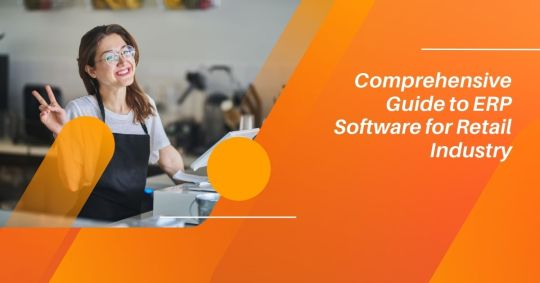
Retail ERP vs. Traditional ERP
A erp software for retail industry system is catered to the special processes of multi-channel or omnichannel retailers. On the other hand, a traditional best erp software for retail is outfitted for general business requirements in different industries, e.g. manufacturing or construction. In retail ERP software, the center modules developed are around the workflow of the retail industry.
Some erp software for retail, for example, Brightpearl, can be designed such that they are retail ERPs. When you are looking for a retail version of classic ERP, you are spoilt for choice. Examples of ERP and accounting systems are Acumatica, NetSuite, Microsoft Dynamics 365, SAP Business One, and QuickBooks POS, to name just a few, whose frontend can be integrated with QuickBooks Desktop accounting software.
It pays to buy Quickbooks products and services from a value-added reseller that possess the experience in POS and the level of retail expertise to ensure your QuickBooks retail solution is fine-tuned.
It is possible to fit into a retail and traditional ERPs with an add-on software that serves with purpose specifically for retailers. For Example, AP automation or global mass payments software, for retailers ; Tipalti .Software has enabled companies like Touch of Modern to effectively handle accounts payable and large payment workflows with a small team.
Retail ERP Benefits
The ten good things in a retail ERP are:
Real-time visibility reporting and payment processing
An integrated omnichannel system across the front and back ends
Centralized customer database
eCommerce and physical store integration with an automated POS
Demand forecasting capability
Intelligent procurement, replenishment, and supply chain management
Real-time inventory management
Dynamic pricing capability
Automation in processes for efficient cost savings
Data analytics to support data-driven decision making.
Retail ERP is a real-time, specially customized software system connecting and integrating business processes involved in retail operations. A retail ERP enables retailers to better streamline, automate, and manage front-end and back-office business processes. This is software specially customized for ERP that's designed to help retailers improve their bottom line.
Multichannel commerce involves driving sales through physical retail stores (brick-and-mortar), e-commerce, call centers, and other online sales channels. They may access one or more warehouses and rely on inventory management to fulfill the orders and manage returns.
Automate and Extend Your Retail ERP
Tipalti powers efficiency and enhanced functionality in accounts payable. For businesses, our touchless invoice processing solutions reduce your business expenses.
Best Retail ERP Software Solutions
The erp software for retail business are either specifically designed for the retail sector or part of the traditional ERP systems, add-on third-party integrations poised at elevating the ERP for retail operations.
ERP Systems That Can House Retail-Specific Needs
Some best available ERP systems for retailers include:
Brightpearl
Brightpearl – A review
Brightpearl is an omnichannel retail ERP software solution designed for retailers and wholesalers.
The company bills its software as a Digital Operations Platform that can process thousands of orders daily. Brightpearl is purpose-built retail ERP. It offers eCommerce integrations with BigCommerce, Magento, Shopify, Amazon, eBay, and even Walmart these are erp software for retail shop.
Stated differently, Brightpearl, the retail version of Sage, allows for:
Real-time data
Sales order management
Inventory management and demand planning
Shipping and fulfillment
Warehouse management
Retail accounting
Purchasing and supplier management
Workflow automation
Reporting and business intelligence
Built-in, pre-integrated third-party app solutions for new channels and functional tools
SAP Business One
SAP Business One is ERP software that functions in the cloud for small and mid-sized businesses. By augmenting the following functionality to the ERP software, retailers using SAP Business One get support for:
eCommerce and omnichannel
Back office, online, and in-store operations
Point of sale and payment processing
In-store and inventory management
Analytics and reporting
Acumatica Retail-Commerce Edition
Acumatica
This is Acumatica's retail and eCommerce ERP solution. It is a multi-channel, cloud-based software, and it is best branded as the 'Retail-Commerce Edition' by small and middle-market businesses. Acumatica offers 24/7 customer service as a core feature in ERP.
It has other features such as:
Financial management
CRM
Warehouse management
Sales Order Management
Customer Self-Service Portal
Reporting and data analysis tools
Inventory management
Purchase
0 notes
Text
POS Machine Price in Qatar: A Comprehensive Guide to Current Costs and Trends
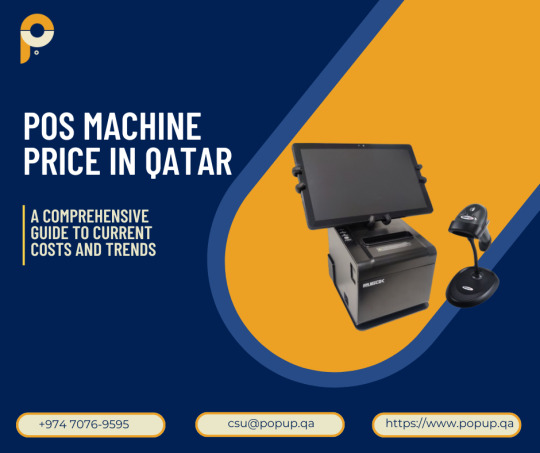
In the rapidly evolving retail landscape, Point of Sale (POS) systems are crucial for businesses aiming to enhance efficiency and customer service. In Qatar, the demand for POS systems is growing, driven by the need for advanced technology in retail and hospitality sectors. This article provides a detailed overview of POS machine prices in Qatar, helping businesses make informed decisions based on their needs and budget.
Key Factors Influencing POS Machine Prices in Qatar
Type of POS System: The type of POS system significantly affects the price. Options include:
Countertop POS Systems: These are the traditional models featuring comprehensive hardware and software integrations, typically ranging from QAR 1,500 to QAR 7,000, depending on the features and brand.
Mobile POS Systems (mPOS): Ideal for businesses requiring flexibility, such as food trucks or small retail setups, mPOS systems are generally more affordable, with prices starting from QAR 500 to QAR 2,500.
Cloud-Based POS Systems: These systems offer scalability and flexibility, often involving a subscription model rather than a one-time purchase. The total cost can vary widely based on subscription fees and additional features.
Brand and Quality: Established brands like Square, Shopify, and Lightspeed are often priced higher due to their reliability and extensive support. Lesser-known brands may provide more budget-friendly options but could lack some advanced features.
Features and Customization: Advanced features such as inventory management, CRM, and detailed reporting can increase the price of a POS system. Customization to integrate with existing business systems can also impact overall costs.
Hardware and Accessories: Additional hardware, including barcode scanners, receipt printers, and cash drawers, can affect the total price. Bundled packages that include these accessories might offer better value.
Service and Support: Comprehensive support and maintenance packages can also influence the cost. Investing in a system with good customer support can be beneficial, especially for businesses new to POS technology.
Current Pricing Trends for POS Machines in Qatar
As of mid-2024, here is a general overview of POS machine prices in Qatar:
Entry-Level POS Systems: Basic systems suitable for small businesses are priced between QAR 1,500 and QAR 3,000. These typically include fundamental features necessary for everyday operations.
Mid-Range POS Systems: Systems with more advanced features, including inventory management and customer tracking, range from QAR 3,000 to QAR 7,000. These are suitable for growing businesses with more complex needs.
High-End POS Systems: Premium models with extensive features, customization options, and comprehensive support can cost from QAR 7,000 to QAR 15,000 or more. These systems cater to larger retail operations and businesses with intricate requirements.
Mobile POS Systems: For mobile POS solutions, the cost varies from QAR 500 to QAR 2,500. Advanced configurations and additional features may increase the price.
Conclusion
Understanding POS machine prices in Qatar is crucial for making an informed investment in technology that supports business growth. By evaluating the type of POS system, brand reputation, features, and additional costs such as hardware and support, businesses can select a solution that aligns with their operational needs and budget.
For the most up-to-date information on POS machine prices in Qatar, consulting with local vendors and comparing options is recommended. This will ensure you find a POS system that offers the best value and functionality for your business.
0 notes
Text
Best POS Systems for Small Businesses in 2024: Top Picks
Choosing the best POS system for small businesses can have a significant impact on efficiency, customer satisfaction, and overall business growth. Modern POS systems go beyond simple transactions by offering tools for inventory management, reporting, and customer engagement. Here’s a guide to the best POS systems for small businesses in 2024.
Why Your Small Business Needs a POS System
A good POS system is more than just a payment processor. It offers a range of features that streamline operations and boost sales. Here are a few benefits of using a POS system for your small business:
Simplified Inventory Management: A POS system helps track stock levels in real-time, making it easy to reorder when inventory runs low.
Detailed Sales Reports: Most POS systems generate detailed reports that allow business owners to analyze sales trends, identify best-sellers, and improve forecasting.
Improved Customer Experience: A fast, efficient checkout process, along with loyalty programs and personalized promotions, enhances customer satisfaction.
Employee Management: Some POS systems include tools for managing employee hours, tracking performance, and streamlining payroll.
Top POS Systems for Small Businesses in 2024
Square POS: Square is known for being highly intuitive and cost-effective, making it a top choice for small businesses. It offers a free version with basic features like inventory tracking, online sales integration, and customizable POS hardware options.
Shopify POS: Shopify POS is ideal for small businesses that also have an online presence. Its seamless integration with Shopify’s e-commerce platform makes it easy to manage inventory across both physical and online stores. Features like mobile checkout and customer profiles make it a standout option.
Lightspeed POS: Lightspeed is great for small businesses with extensive inventory needs. It includes advanced inventory management features and real-time sales tracking. Lightspeed also allows for multi-location management, which is perfect for growing businesses.
Clover POS: Clover offers customizable POS solutions, allowing small businesses to tailor their system to meet specific needs. Whether it's a mobile POS for a small café or a more comprehensive system for a retail store, Clover offers scalable options.
Vend by Lightspeed: Vend is a cloud-based POS system that’s easy to set up and use, making it ideal for small business owners who need a straightforward solution. Its excellent CRM and inventory management features help retailers streamline operations and grow sales.
Key Features to Look For
When searching for the best POS system for your small business, keep these essential features in mind:
Usability: The system should be easy to use and require minimal training.
Integration: Make sure the POS system integrates with other tools you use, like accounting software or e-commerce platforms.
Cost: Choose a POS system that fits your budget, but also offers the features you need. Look for flexible pricing plans that can scale with your business.
Mobile Payments: Ensure the POS system supports mobile and contactless payments, as these are becoming increasingly popular among consumers.
Customer Support: Reliable customer service is essential, especially if you encounter issues that disrupt your business operations.
Conclusion
Investing in the best POS system for your small business in 2024 can drive efficiency, improve customer service, and boost your bottom line. By selecting a system with the right features—like inventory management, sales reporting, and easy integration—you'll set your business up for long-term success. Explore the top POS systems like Square, Shopify, Lightspeed, and Vend to find the best fit for your business.
0 notes
Text
Transforming a Fishing Accessories Store in Seattle, WA
A fishing accessories store in Seattle was facing significant challenges in managing its inventory and sales across its physical and online channels. The store offered a wide range of products, from fishing rods to tackle boxes, but the lack of integration between its Retail Pro PRISM POS and Shopify ecommerce platform was causing inventory discrepancies and delayed order processing.
The store decided to implement Octopus Bridge from 24SevenCommerce to integrate its POS and ecommerce systems. The near real-time synchronization provided by Octopus Bridge ensured that inventory levels were always accurate, regardless of where the sale occurred.
This integration not only improved inventory accuracy but also streamlined the order fulfillment process. Online orders were instantly sent to the appropriate store location for processing, reducing delays and improving customer satisfaction. The store could also manage returns and exchanges more efficiently, further enhancing the customer experience.
The integrated system provided valuable sales data, allowing the store to identify popular products and adjust its inventory accordingly. This data-driven approach enabled the store to optimize its stock levels and reduce overstock and out-of-stock situations.
As a result of these improvements, the fishing accessories store saw a significant increase in online sales and overall customer satisfaction. The efficient and seamless integration provided by Octopus Bridge allowed the store to focus on what it did best: providing high-quality fishing gear and excellent customer service to the angling community of Seattle.
0 notes
Text
Choosing the Best POS System for Your Retail Business
In the dynamic landscape of retail and ecommerce, selecting the right Point of Sale (POS) system is crucial for optimizing operations and enhancing customer satisfaction. Here’s a comprehensive guide to help you navigate through the best pos system for retail store tailored for retail and ecommerce environments.
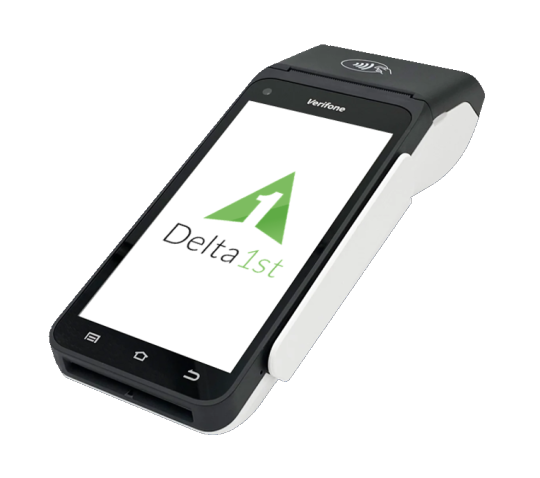
Understanding Retail POS Systems
A POS system is more than just a tool for processing transactions; it’s a comprehensive software solution that streamlines various aspects of retail management. From inventory management and sales analytics to customer relationship management (CRM) and employee tracking, a robust POS system integrates these functionalities into a single platform.
Key Features of an Effective Retail POS System
Inventory Management: Efficient tracking of stock levels, automatic reorder notifications, and real-time updates across multiple sales channels (online and offline).
Sales Analytics: Detailed insights into sales performance, best-selling products, and customer purchasing behaviors to inform strategic decisions.
CRM Integration: Customer database management, personalized marketing campaigns, and loyalty program management to enhance customer retention.
Multi-Channel Capabilities: Seamless integration with ecommerce platforms for synchronized inventory and sales data across online and brick-and-mortar stores.
User-Friendly Interface: Intuitive design that facilitates quick employee training and smooth transaction processing, reducing checkout times.
Ecommerce POS Solutions
For online retail businesses, choosing a POS system that integrates seamlessly with ecommerce platforms is crucial. Look for features like:
Online Store Integration: Sync inventory across your website and marketplace platforms like Shopify, WooCommerce, or Magento.
Mobile-Friendly: Ability to accept payments via mobile devices, accommodating online orders and in-person pickups or deliveries.
Security: PCI compliance and robust encryption to protect customer payment information and ensure secure transactions.
Best POS Software for Retail Store Types
General Retail: Systems that offer comprehensive inventory tracking, sales reporting, and scalability to grow with your business.
Beauty Salons: POS software tailored for salon management, including appointment scheduling, client profiles, and product sales tracking.
Choosing the Right POS System
Consider these factors when selecting a POS system:
Scalability: Ensure the system can grow with your business and adapt to future needs.
Affordability: Balance features and cost, considering both upfront expenses and ongoing fees.
Customer Support: Access to reliable support and training resources for your team.
Conclusion
Investing in the right POS system is a pivotal decision for any retail or ecommerce business. Whether you operate a beauty salon, a boutique, or an online store, the best pos system for small boutique efficiency, improves customer experience, and ultimately drives growth. Evaluate your specific needs, explore available options, and choose a POS solution that aligns with your business goals and enhances operational efficiency.
For More Info:-
best all in one pos system
best ecommerce pos system
best mobile pos system for small business
0 notes